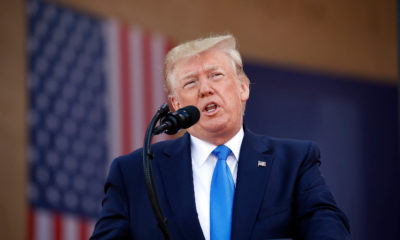World
Trump asks Disney to rehire workers replaced by Indians

Washington: Leading Republican presidential hopeful Donald Trump has asked Disney to hire back every one of the workers they replaced with cheaper foreign IT workers on H-1 B visas largely from India.
“If I am President, I will not issue any H-1B visas to companies that replace American workers and my Department of Justice will pursue action against them,” he told when asked about reports that about 250 Disney workers were forced to train their foreign replacements.
Trump said lobbyists write the rules to benefit the rich and powerful and accused rival Republican presidential candidate Marco Rubio of being in the pay of Silicon Valley CEOs.
“They buy off Senators like Senator Marco Rubio to help them get rich at the expense of working Americans by using H-1B visas-so called “high tech” visas-to replace American workers in all sorts of solid middle class jobs.”
Trump also called on Rubio to rescind his sponsorship of a bill for expanding the H-1B programme and “return the money he has received from Silicon Valley CEOs and to donate the money to a charity helping unemployed Americans whose jobs Rubio has helped to destroy.”
Trump’s comments came as two former Disney employees alleged that they were forced to train their Indian replacements as the entertainment group sought to bring in cheaper foreign workers on H-1 B visas.
David Powers and Leo Perrero who worked at Disney World told WWSB ABC 7?, a local Florida TV station that shortly after “a great performance review,” a VP invited them into his office and told them they were being laid off.
“I’m in the room with about two-dozen people, and very shortly thereafter an executive delivers the news that all of our jobs are ending in 90 days, and that we have 90 days to train our replacements then we won’t get a bonus that we’ve been offered,” Perrero, a former app developer for Disney was quoted as saying.
On top of the job loss, the two men told ABC 7 that training their Indian replacements — at their own desks, no less — stripped them of their dignity.
“I felt extremely un-American,” Perrero says. “I felt like I was part of destroying our economy because I had to train a replacement that was going to come here, take my job and potentially take other people’s jobs.”
Sarasota-based employment Attorney Sara Blackwell, who is representing both men, told the channel that this isn’t just a problem with Disney. Companies, including Toys R Us, IBM and Verizon, have been contracting with companies and outsourcing work.
“H1B, when done properly, is a great avenue,” she said. “The purpose of H1B is to bring in foreign workers, when there’s no qualified US worker.”
But when Disney lets go of more than 250 employees at once, something doesn’t add up.
In response, ABC 7 said, Disney acknowledged it outsourced Powers’ and Perrero’s jobs to Indian workers, but also claimed they’ve expanded and added jobs for US IT workers.
World
Lockdowns in China Force Urban Communities to Defy Censorship and Vent Frustration Online

Shanghai’s rich middle class is leading a wave of online dissent over the strict and prolonged lockdowns imposed in various parts of the country. Chinese internet censorship is struggling as patience is wearing thin in many urban centers, coming up with creative forms of online protests.
Social Media Posts Revealing Lockdown Tension in Shanghai
Drawn-out lockdowns are nothing new in China as authorities insist with the nation’s zero-Covid policy since the start of the pandemic. Currently over This time around, however, metropolitan areas like Shanghai are increasingly difficult to keep quiet, given that its more than 25 million residents have seen weeks of total isolation along with food shortages and many other service interruptions.
Dozens of towns and reportedly over 300 million Chinese citizens have been affected by lockdowns of different severity. As expected, urban netizens have been most outspoken over their difficulties by finding creative ways to get around state censorship and bans placed on topics, news comments and spontaneous campaigns.
Shanghai residents have been using mobile proxies and hijacking seemingly unrelated hashtags to talk about healthcare issues, delivery failures and the overall severity of their situation. The “positive energy” that the Chinese government wants to transmit during the recent prolonged series of lockdowns does not come naturally to those counting food supplies and online censors are working hard to filter words, trending topics and undesired social media sharing.
WeChat groups and message threads are under constant monitoring. Posts questioning the zero-Covid approach have been quickly deleted, including by leading Chinese health experts like Dr. Zhong Nanshan. Video footage is soon censored and protests and investigations are quickly made to disappear.
Where this has not worked, officials have exposed banners with warnings and outright threats like “watch your own mouth or face punishment”, while drones have been patrolling the city skies. Yet, if anything, this has led to further tensions and unspoken confrontation with Shanghai’s educated and affluent middle class.
Creative Online Solutions Harnessing Civic Energy
Announcements by Chinese social media that they would be publishing the IP addresses of users who “spread rumors” have not helped either. Tech industry research has shown that much of Asia’s tech-savvy population has a habit of using mobile proxies and other privacy tools, quickly finding workarounds to browse the internet freely and talk to the world about the hottest topics.
The sheer volume of forbidden posts is already a challenge for the very censorship system, experts explain. Unable to track all trending hashtags, state workers overlook topics that speak about the US, Ukraine or other popular news. Linking human rights elsewhere to their situation, Chinese online dissidents establish their informal channels and “hijack” the conversation to share personal or publicly relevant information about the Covid suppression in their town.
Sarcastic and satirical posts still dominate. Others hope to evade the censors by replacing words from famous poems or the national anthem. One thing is certain – social media, when harnessed with the right creativity, has proven its ability to mount pressure on the government in even some of the most strictly controlled tech environments like China.























